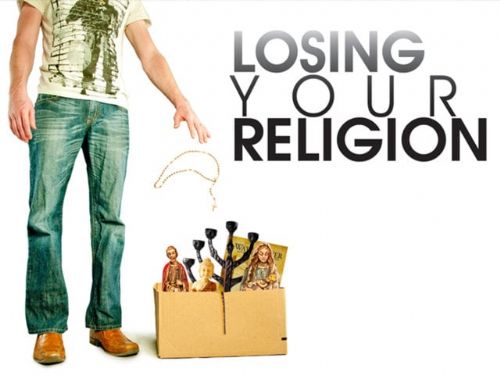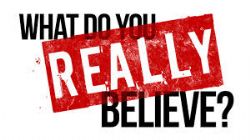There's a lot of talk these days about finding Christianity without religion. It seems that religion has become the latest scapegoat for the ills of the world today - and not undeservingly. After all, the recent terror attacks on Paris, France, were carried out be to cries of "Allahu Akbar" meaning "God is [the] Greatest."
Religion has certainly played its role in many of the challenges that I faced in life. Because of what I heard in church I struggled for many years with self-acceptance, fear, and relationships. Over the next few weeks, I will be sharing some of the most frequent misconceptions I hear from people I when I say, "I lost my religion."
Misconception #1: Without Religion People Have No Morals
As I began to rethink my beliefs one of the biggest challenges I faced was figuring out what was right and wrong. I had been so indoctrinated with the idea that the Bible was my moral compass, that any mistakes contained within its pages was a real blow to my faith. Beyond that, if I couldn't trust the Bible to guide me in my decision then what would I do? Heaven forbid, I think for myself and listen to my heart. My heart was evil, wicked above all things, according to my religion. In my brainwashed mind, there was no way I could be moral without religion.
When I was about eight years old, my bestfriend and I were playing on the jungle gym at the park when a stranger about our age approached us. It was unusual for us to come across someone we didn't know in this area. Our school wasn't very large, and this is before the time when kids went to schools outside of their area.
This kid wasn't dressed very nicely. His shorts were torn, and his shoes were clearly well past worn out. Even though he wasn't dressed nicely, his smile was bright and he was full of joy. I still remember his smile and the warmth of his energy to this day.
Another really odd thing about this kid was he was alone. He simply showed up. It seemed like he just came from nowhere. Our neighborhood was safe, and we rarely had parental supervision, but this was strange. We didn't know him and had never seen him before, yet there he was.
We invited him to join in our game, chasing each other around the park, climbing all over the jungle gym, swinging from the ropes, and jumping from level to level. It was so much fun! He was kind, funny, and a blast to play with. At one point, he was declared the winner of whatever it was we were playing, but my best friend didn't like losing.
He began to pick on this kind stranger. He talked about his hair, his clothes, and his shoes. The things he said would have made anyone else cry, but not this kid. This kid simply smiled and said, "That's ok. I like what I have and I had fun with you guys." I was devastated. With tears in my eyes, I turned to my friend and said "Why would you do that?!? You shouldn't be so mean!" When I turned back around the stranger was gone. We never saw him again.
At eight years old, I didn't have a degree in Biblical Studies. I had never attended Bible school and I didn't know the 10 Commandments. Sure, I had been to church, but I was a kid. There was no moral compass guiding what I felt that day. No adult was there to discipline me. I didn't have the fear of a vengeful God sending me to hell to keep me in line. I simply felt like what just happened was wrong. Very wrong.
My fragile heart was broken by injustice. I desperately wanted an opportunity to be able to apologize to the victim of this verbal abuse. Even though I was not the one who was the "sinner," I still felt a responsibility to protect and restore the victim, all without religion telling me to.
Has there ever been a time in your life when you just felt like something was the wrong thing to do? Have you ever seen someone do something brave, or kind, without being forced to do it? Of course you have. We all have. This is proof that goodness is not limited to Christianity, or religion in general.
When I talk to people who have come to believe that God has certain rules we must follow and without the Bible we wouldn't be able to do anything good the conversation ends up with a root of fear of punishment. The biggest objection I hear most often is, "If there are no rules and we can just do anything we want to do and still go to heaven, then what's the point of doing good?" This question reveals a lot about a person. My response is almost always "What is it that you want to do?"
Very rarely do I get a personal answer. It's usually something along the lines of, "It's not what I want to do, but what about murderers?" So I'll ask, "Do you want to murder someone?" "Of course, not!" is the typical response. The issue isn't usually that the person wants to do a heinous crime. It's usually a fear of what other people will do without the rules.
The heart of this misconception is the belief that people are born evil and they become moral when they accept a particular faith. In the Christian tradition, the idea is that all humanity is evil and they must be "born again" by receiving Jesus in order to be a good person. I think a simple observation of humanity is proof enough that this is, in fact, a misconception. It's just not true.
Now, I'm not suggesting that religious beliefs don't curb bad behavior, or cause people to do some good things. However, I am suggesting that religion causes people to bury or hide their challenges and advertise their goodness. This isn't authentic morality, it's deception.
When you don't allow the truth of who you are to be seen by others you don't allow yourself to grow. The Scriptures say to confess your faults to each other so that you may be healed. Heck, even in the 12-step recovery programs, the first step is almost always to acknowledge you have a problem. Sure, religion says "acknowledge you are a sinner," but then once you say the magic prayer, you are supposed to be perfect.
No one says it that way, but I think you can agree, it's the way it is. There is this common idea that "Christians don't act like that." Facebook is the land of "You can't be a Christian and (fill in the blank)." Those in religion become disconnected from reality and fail to see the intrinsic moral nature of all humanity.
The objections, "What about people like Hitler" and "What about Isis" are often thrown at me when I teach about the goodness of all humanity. This shows how much people really want to find a scapegoat for the problems of the world. Those particular objections, and others like it, can be easily overcome with just one fact. Hitler was a deeply religious man who believed he was doing what God wanted by cleansing the earth. Isis believes they are serving God.
When we get right down to it, much of what has become of religion isn't moral, it's awful. In an effort to be right, we have become unrighteous. It is no secret that I am pro-life. What separates me from many of my religious counterparts is that I am pro all life. The extremist in the pro life camp don't see anything wrong with bombing an abortion clinic in the name of God. These same people are usually very much anti gay as well.
They see no problem with denying life long partners the right to hospital visitation, to equal protections, but they do have a problem with them being lovers of the same gender. It defies logic and reason. When we use a particular religion as the ultimate guide for morality, we will always end up losing. There is always going to be an "us versus them" mentality when religion is the guide for what is right and wrong.
Humanity is ultimately good at its core. All of humanity, without exception. Children must be taught to hate, to fear, to be prejudice. It is our nature to love, it is our nature to be moral. I submit to you that without religion we regain the ability to be who we really are. Religion does not always make us moral, it usually makes us morons.
The next misconception we will take a look at is the notion that Jesus is a Christian.
Visit Pastor Will's blog at http://willruckerwrites.blogspot.com.


